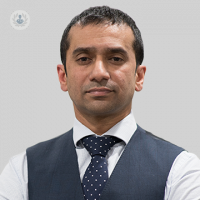Dysphagia: symptoms and causes of this common condition
Written in association with:What is dysphagia?
Dysphagia is a broad term that refers to swallowing difficulties and is surprisingly common. Estimates suggest that one in five adults experience some symptoms of dysphagia, although most cases are not serious.

What causes dysphagia?
There is not one single cause for dysphagia. Swallowing is a complex action, so there are a number of reasons which can make it hard to swallow.
Typical dysphagia causes include:
- due to an obstruction – e.g. food bolus obstruction, cancerous growths
- neurological causes e.g. secondary to a stroke
- secondary symptom to severe reflux
- advancing years / age-related poor muscle coordination
What are the symptoms of dysphagia?
As the word implies, the main symptom is "difficulty swallowing".
There can be other associated symptoms that may point to a possible underlying cause. For example, an elderly patient with dysphagia who often regurgitates undigested food could have a condition called a pharyngeal pouch, which is treatable.
Learn more about pharyngeal pouches here!
If dysphagia is progressively getting worse, and with pain and weight loss, then this certainly needs further investigations by an ENT specialist, as it can be a sign of cancer. To make an accurate diagnosis, it is important to be aware of the various associations and make the necessary investigations.
The red flags and dysphagia symptoms to watch out for are:
- progressive or worsening dysphagia
- weight loss
- hoarseness
- pain - especially one-sided pain when swallowing
- a history of smoking and drinking alcohol
How is the underlying cause of dysphagia diagnosed?
A detailed history is often helpful in uncovering the underlying cause of the dysphagia. Most patients require an examination with a special flexible camera that can look at the top of the gullet. Special X-rays and scans may then be necessary.
There are a few patients who may require a more detailed endoscopy procedure, as a day case in hospital. The treatment then varies depending on the diagnosis.



